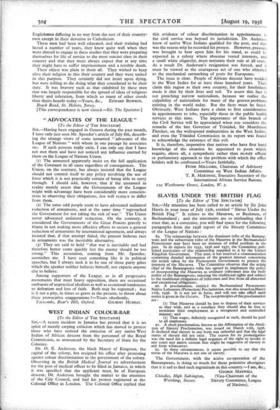WEST INDIAN COLOUR-BAR
[To the Editor of THE SPECTATOR] SIR,—A recent incident in Jamaica has proved that it is no spirit of merely carping criticism which has moved to protest those who have noticed the omission of any native West Indian of African descent from the personnel of the Royal Commission, as announced by the Secretary of State for the Colonies.
Dr. 0. E. Anderson, the black Mayor of Kingston, the capital of the colony, has resigned his office after protesting against colour discrimination in the government of the colony. Observing in the British Medical Journal an advertisement for the post of medical officer to be filled in Jamaica, in which it was specified that the applicant must be of European descent, Dr. Anderson brought the matter to the attention of the City- Council, and had his protest registered at the. Colonial Office in London. The Colonial Office replied that
this evidence of 'colour discrimination in appointments to the civil service was beyond its jurisdiction. Dr. Anderson knew of native West Indians qualified for the post, and that was the reason why he recorded his protest. However, pressure was brought to bear upon him for his stand, as could be expected in a colony where absentee vested interests, and a small white oligarchy, must maintain their rule at all costs. As a result Dr. Anderson's resignation was forced, and it must be viewed as the courageous act of one who objected to the mechanical earmarking of posts for Europeans.
The issue is clear. People of African descent have resided in the West Indies for at least three hundred years. They claim this region as their own country, for their forefathers made it that by their lives and toil. To assert this fact is not preaching narrow nationalism, because we realise the culpability of nationalism for many of the gravest problems existing in the world today. But the -facts must be faced. Obviously, West Indians have a claim to first consideration in appointments to jobs, especially those in the public health services at . this time. The importance of this branch of the Civil Service will be appreciated when one considers the remarks of the late Governor of Trinidad, Sir Murchison Fletcher, on the widespread malnutrition in the West Indies, and even the Trinidad Commission in its report was found to acknowledge the existence of this evil.
It is, therefore, imperative that natives who have first hand knowledge of the situation be appointed to posts which require, above all, a sympathetic rather than merely official or perfunctory approach to the problem with which the office holders will be confronted,Yours faithfully,
Pi IER MILLIARD, Chairman of Advisory
Committee on West Indian Affairs. T. R. MAKONNE, Executive Secretary of the International African Service Bureau.
z2a Westbourne Grove, London, W. 2.






































 Previous page
Previous page